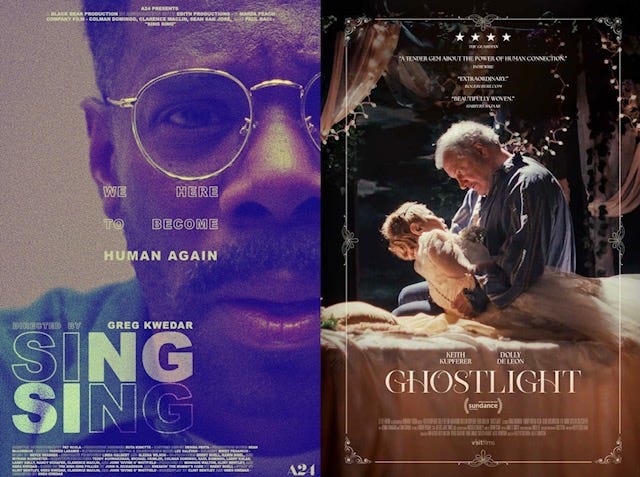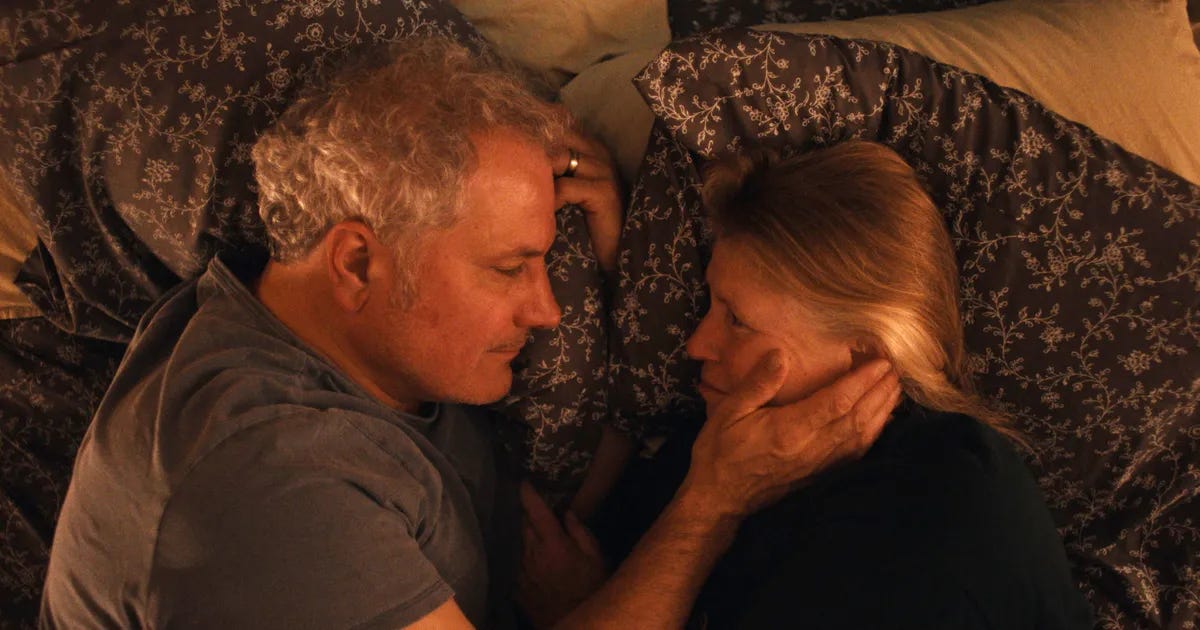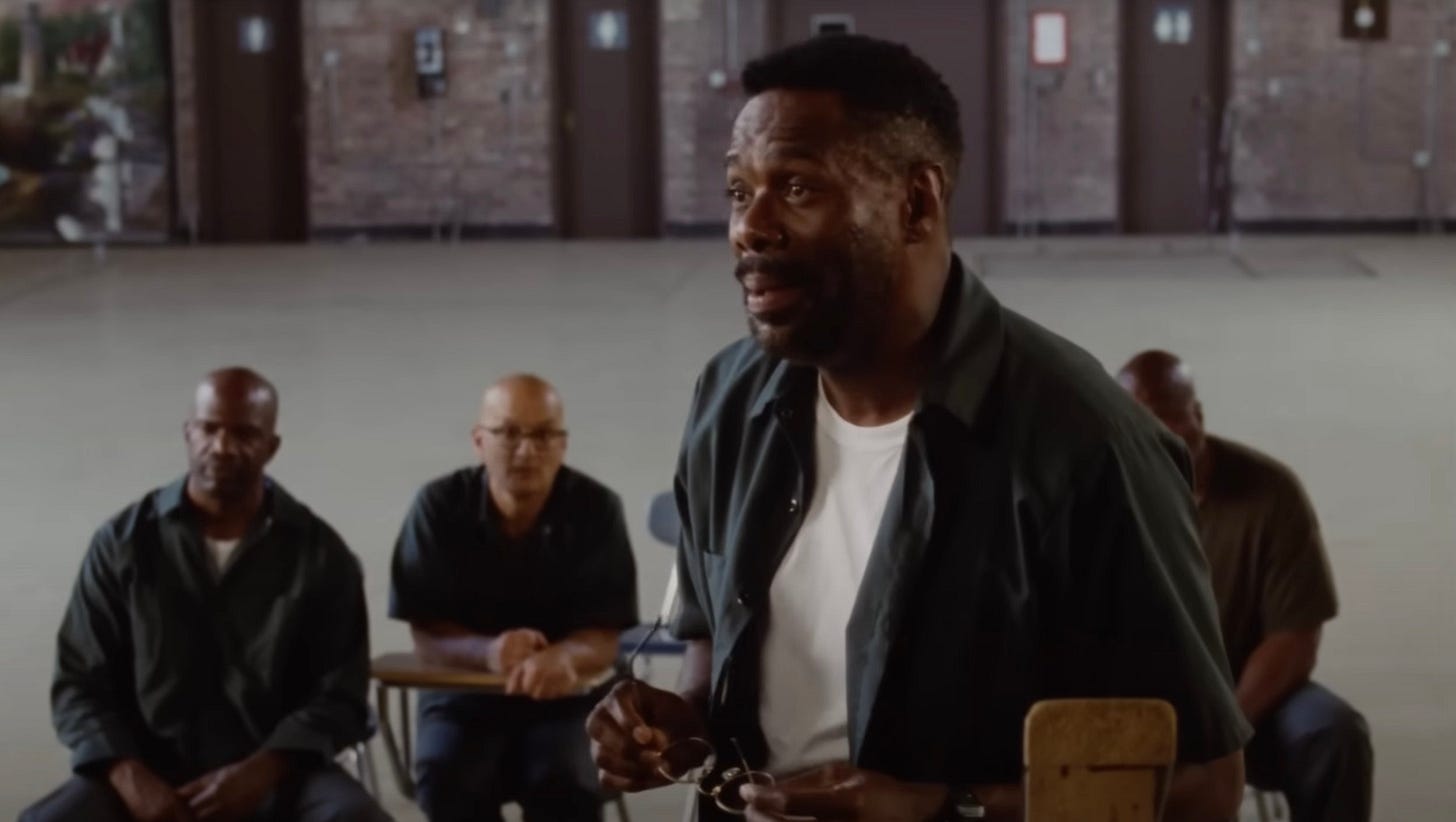Sing Sing / Ghostlight
Two films about expression and grappling with trauma and emotions through the art of theater, aka two films that have a death grip on my heart.
If you’ve been paying attention to recent new releases to hit theaters, you’ve probably come across rave reviews for Greg Kwedar’s Sing Sing. Maybe you’ve even been fortunate enough to see it already and give it your own rave review.1
I caught Sing Sing a few weeks ago in theaters, just shy of its wide release in the U.S., and it’s a movie I’ve been thinking a lot about ever since. For the uninitiated, Sing Sing is a film based on the story of the Rehabilitation Through the Arts (RTA) program at Sing Sing Maximum Security Prison. RTA is a program that connects professional artists with inmates to teach them theater, dance, music, creative writing, and visual arts.
Sing Sing is a poignant yet beautifully told story of inmates in the RTA program as they prepare to perform an original theater production called Breakin’ the Mummy’s Code, a play that features cowboys, gladiators, ancient Egyptians, pirates, and even Hamlet. At the center of the story is John “Divine G” Whitfield (Colman Domingo), who is in prison for a crime he didn’t commit. He is the soul of the RTA program—while not the official director, he often takes on the role of the director’s assistant, able to convey character motivations and set the scene for his fellow actors in ways that those from the outside just can’t.
While preparing for their performance, Divine G also has the daunting task of preparing for his upcoming parole hearing. It’s a story that, in the wrong hands, could have ended up feeling too outlandish or too saccharine, but it avoids going too far in those directions with a strong script and some of the most raw, truthful acting performances I’ve seen in a minute.
It certainly helps that most of the cast were former incarcerated actors and alumni of the RTA program themselves. Aside from Domingo—who is absolutely sprinting towards a well-deserved Oscar win for this role—the performance of Clarence "Divine Eye" Maclin (as himself) was striking, revelatory. I’m rooting for him to get his flowers come this award season, with a fruitful acting career to follow—one where he’s hopefully not relegated to just playing criminals.2 He has the chops to do so—in a recent New Yorker interview, Maclin described how he channeled his personal experiences in prison for his performance:
“I used to picture my mom walking in that building right there, where we lived at, after doing a hard day’s work, and people be pointing at her, and not even for shit she did. For shit I did. That’s a fucked-up feeling! That shit translates into tears. That shit translates into putting curtains up on the bars and crying into the mirror so nobody sees you.” He added, “Now I pour all of that into the character.”
Truth in acting is so vital to a good performance, and Maclin is an actor who inherently understands that—he understands the importance of empathy and vulnerability when making art, and that’s what the RTA program teaches. That’s how art heals and rehabilitates.
But Sing Sing isn’t the only film to come out this year with an emphasis on the healing power of art—and, specifically, theater. Ghostlight, a film that seems to have flown under the radar a bit, is right up there with Sing Sing for one of my favorite films of the year so far, and it’s unsurprising considering their themes are so similar.
Ghostlight follows Dan (Keith Kupferer), a gruff, reserved construction worker who’s having trouble managing his home life—his daughter (Katherine Mallen Kupferer) is acting out, and he’s stressed over an upcoming deposition for a lawsuit his family is filing against another local family.3 This stress causes him to take out his anger on a rude driver (who totally deserved it btw) while on the job. Rita (Dolly de Leon), a woman from a local community theater who witnesses this attack, invites Dan to the theater to audition for the company’s production of Romeo and Juliet.
Eventually cast as Romeo, Dan starts attending rehearsals in secret, causing suspicion from his wife (Tara Mallen)4 and daughter. As the performance draws closer, Dan struggles to perform as Romeo, finding the actions of his character to hit a little too close to home. It causes Dan to reckon with his emotions in a way that he never had to before—there is one rehearsal scene, in particular, that was so powerful it rendered my surprisingly densely populated movie theater speechless, fully silent for a few minutes. You’ll know the scene when you see it, I promise.
I want to keep my descriptions vague here because it’s a benefit to the viewer to go into Ghostlight with as little knowledge of the plot as possible. I went to see Ghostlight after seeing only a scant 30-second teaser on Instagram and a cursory glance at the synopsis. This was the right move, even though I’m not of the opinion that “spoilers” ruin a movie (a topic for another day), and even though I believe the performances here are so good that it would take a lot to dampen their impact. The filmmakers, Kelly O’Sullivan and Alex Thompson, leave us little breadcrumbs of detail as the plot unfolds, and it’s best to take them in piece by piece, eventually culminating in something big and heartfelt and truly special.
Like Clarence Maclin in Sing Sing, I am desperately hopeful that Keith Kupferer will see some recognition for his performance this year. His portrayal of an emotionally stunted middle-aged man, ready to burst, was so compelling and so thrilling and so refreshing to watch. I simply love to see a longtime character actor with mainly bit parts on his resume finally get a chance to really shine, and that’s exactly what he does in Ghostlight.
As a reformed theater kid, I’m all too familiar with the ways in which art, and specifically the theater arts, can be a beacon to someone who is lost. I spent much of my adolescence feeling alone and out of place, but I found community and joy and confidence and hope when I found theater. I made lifelong friends through working in theater, both on stage and behind the scenes. So it’s really no surprise that these two films resonated with me so deeply.
But beyond the message of healing through theater, both of these films deal with breaking down the emotional walls that traditional masculinity builds up. These characters are not lesser men for being vulnerable and getting in touch with their emotions—they’re better men for it. Maybe that concept is old news if you’re a highly evolved human being like myself, but it’s an unfortunate reality that we still need to pound this idea of emotional awareness not being equated to weakness into the thick shiny heads of many a modern man. If you happen to know such a man, my homework for you is to force one or both of these films into their eyeballs.
I’m tempted to recommend Ghostlight and Sing Sing as a double feature, but I do fear that would potentially cause a tsunami of tears to overwhelm the masses. So maybe space them apart, but these are two films that are deserving of as much viewership as possible, if only to try to get more movies like these to be made. As much as I love to hoot and holler at a rollicking romp or a boisterous blockbuster, I’m always going to champion these quiet little gems that get lost in the shuffle of established franchises and mainstream films with bloated marketing budgets. So this weekend, after you come home from seeing a sequel you didn’t really like as much as the original, or a book-to-movie adaptation that fell flat, consider seeking out one of these movies to help make up for it.
Sing Sing is in theaters now.
Ghostlight is available to stream on Philo, AMC+, and available to rent on most platforms
If you’ve seen the film and your review was NOT rave, do not talk to me.
In the same New Yorker article quoted, Maclin stated that he’d like to play Lieutenant Worf in a Star Trek movie. I hope this comes to fruition because, truly, he would make an excellent Worf!!!
Saying too much more about this lawsuit WILL give away pretty much the whole plot of the movie, so that’s why I’m leaving this very weirdly vague. Just go watch it!!!
No, you’re not seeing things—the actor who plays the daughter does in fact have the same last names as the actors who play her parents. They’re a real family! IRL!! And I love that!!!










